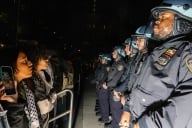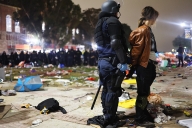You have /5 articles left.
Sign up for a free account or log in.
When asked by a reporter about how he would handle one of his players protesting racial inequality by not standing during the national anthem, Clemson University's head football coach, Dabo Swinney, said he would not resort to discipline.
Then Swinney continued to speak for eight minutes, criticizing athletes who have not stood for the anthem in recent weeks and comparing their form of protest unfavorably to the work of the Rev. Martin Luther King Jr. Of those protesting police violence, he said, “Some of these people need to move to another country.”
The suggestion that those who are protesting during the anthem (silently and without disrupting) should consider leaving the U.S. angered many people. And many were stunned that the coach -- arguably among the more powerful people at Clemson -- would suggest that nonviolent protest over injustices to black people was inconsistent with the work of King, whose career was full of just such nonviolent protest.
Some commended Swinney’s comments, which also included a plea for the country to “love the Lord with all your heart” and to “love your neighbor as you’d love yourself,” as well as repeated references to Jesus. Others, including some Clemson students and faculty members, criticized the coach’s comments, however, for evoking a sanitized version of King’s protests -- which historians would argue were far more controversial at the time than sitting or taking a knee during the national anthem is today -- and for suggesting that black activists should leave the country.
“I winced when I heard a reporter ask you, a white man who makes somewhere in the area of $5 million a year from the physical labor and bodily risk of unpaid black athletes, if he would ‘discipline’ them for making a political statement,” Chenjerai Kumanyika, a communications professor at Clemson, wrote in an open letter to the coach. “Given that you and I both work on the former plantation of John C. Calhoun, the historical significance of the question is staggering and troubling.”
Other criticism has come from the New York Daily News, Slate and CBS Sports. Some Clemson fans and students took to Twitter, calling the comments "tone-deaf" and a "whitewash" of King's activism. The university declined to comment on the matter.
Clemson has struggled in recent years to navigate the university’s racist roots. Students and faculty continue to protest that a prominent building on campus is named for Benjamin Tillman, one of the university’s founders and a vocal white supremacist. Tillman was once South Carolina’s governor and represented the state in the U.S. Senate for 23 years. He also helped orchestrate the assassination of a black state senator in 1876.
The university also faced criticism this year when it featured the slave plantation home of Calhoun, a former U.S. vice president with white supremacist views, on its commencement brochures.
Kumanyika, in his open letter, cited the buildings as evidence that there are many ongoing injustices against people of color that are worth protesting, and not by just releasing a statement.
“In the face of the injustices in his own time, Dr. King called for direct action, not press conferences,” Kumanyika wrote. “He and those that fought with him brought the struggle to buses, games, counters, workplaces and other places that were deeply inconvenient and often illegal. Dr. King points out that none of these direct-action efforts were ‘well timed’ in the eyes of his vocally supportive but privileged and paternalistic critics. Coach Swinney, based on your statements, I think that maybe you would not have liked Dr. King if you had known him.”
In his comments Tuesday, the head coach said athletes hoping to take a stand on an issue should do so during news conferences, not when they’re on the field, calling such actions “a distraction” to the rest of the team.
“I don’t think it’s good to use the team as a platform,” Swinney said. "I totally disagree with that. I just think there’s a right way to do things. I don’t think two wrongs make a right. Never have, never will. I think it just creates more divisiveness, more division.”
Though Swinney’s comments went further than most, Clemson’s coach isn’t the only college official to express such a sentiment in recent weeks. While careful to say students have the right to protest racial inequality in any legal way they see fit, some coaches and administrators have also expressed displeasure for this particular brand of activism.
William H. McRaven, chancellor of the University of Texas System and a retired navy admiral, sent a note to system presidents and athletics directors urging them to encourage athletes to show respect by standing during the national anthem. "Those who believe that the flag represents oppression should remember all the Americans who fought to eliminate bigotry, racism, sexism, imperialism, communism and terrorism," McRaven wrote.
Last month, Jim Harbaugh, head football coach at the University of Michigan, was asked about NFL player Colin Kaepernick’s decision not to stand during the national anthem. Kaepernick is a former player of Harbaugh’s, from when he coached the San Francisco 49ers. “I acknowledge his right to do that,” the coach said. “But I don’t respect the motivation or the action.”
Harbaugh later walked back some of his statement, tweeting that he supported Kaepernick’s motivation, but still took “exception to” his form of protest.
Dan Lebowitz, executive director of Northeastern University’s Center for Study of Sport in Society, said it’s disappointing to see college coaches criticize player protests in this fashion. He was critical of Swinney’s comments, in particular, saying they seemed to indicate the coach cares more about winning games than helping his players grow as young men.
College athletics -- and sports, more generally -- provide a platform that is unavailable to many who wish to protest injustices, Lebowitz said. He said colleges and coaches have a responsibility to, if not outright help players use that platform, at least not disparage those that do.
“I think any coach that tells players to keep protest off the field is, in many respects, deflecting their responsibility as coaches and teachers and as Americans,” Lebowitz said. “It’s important to empower athletes to speak out against injustice, and to do so with courage and conviction.”








